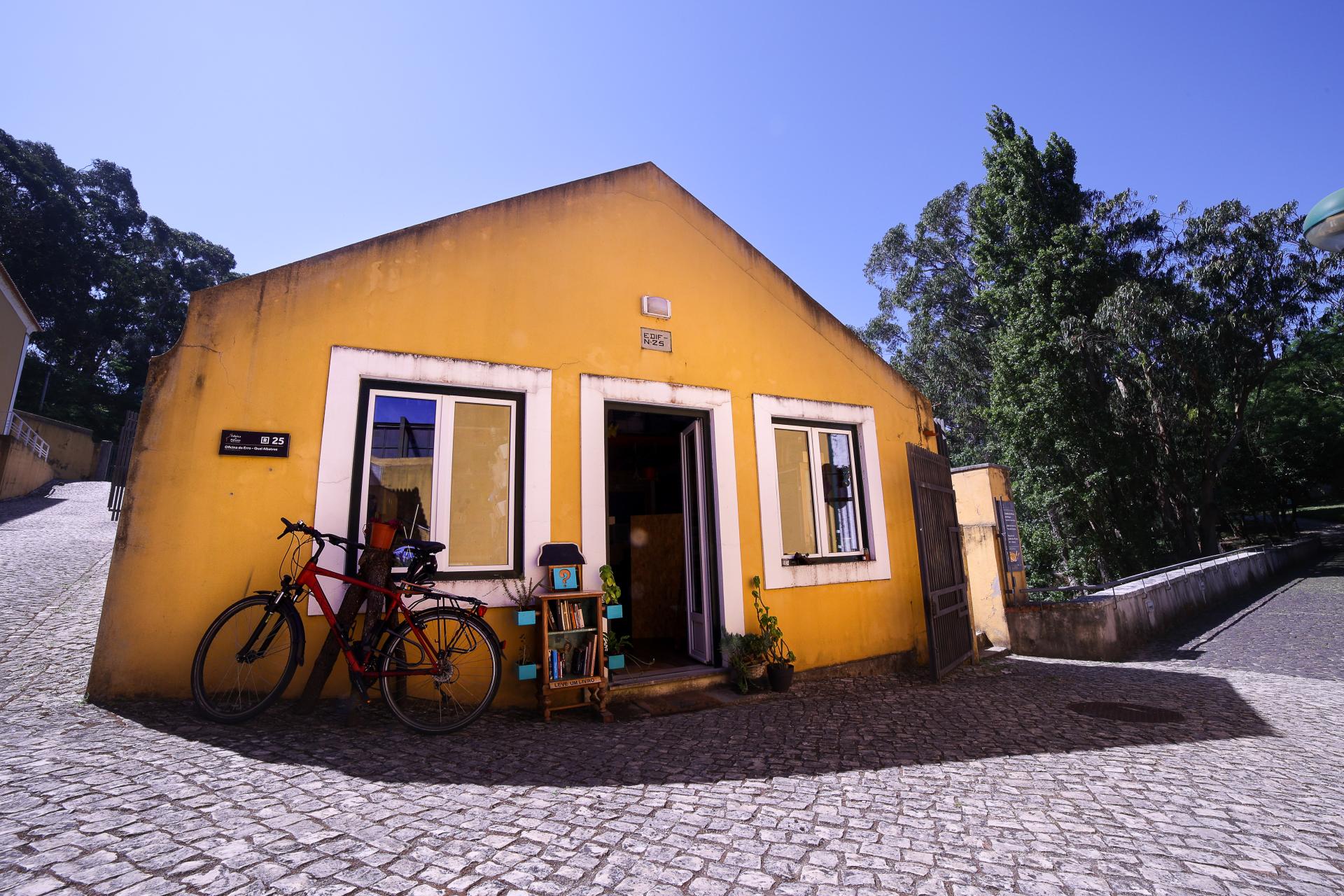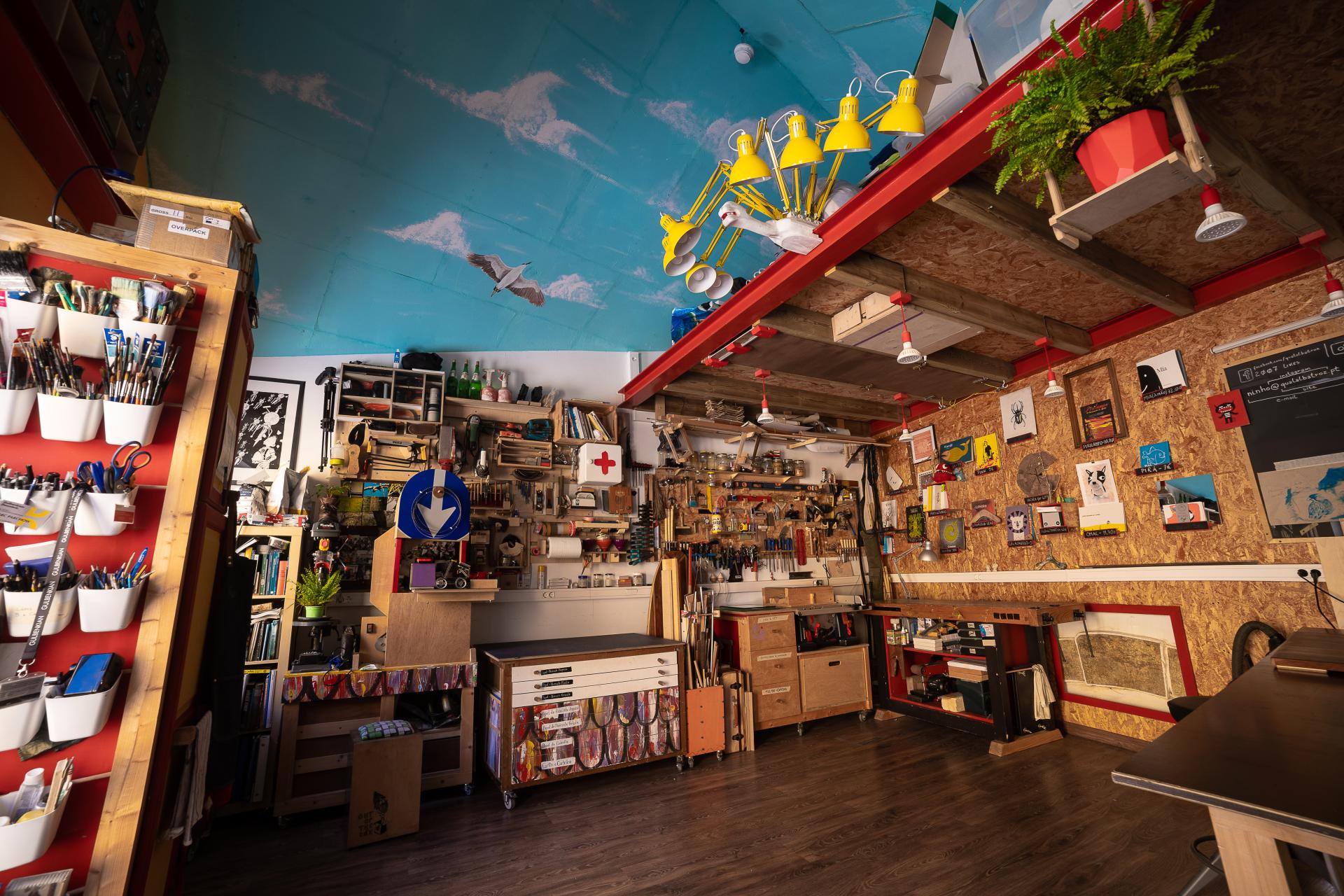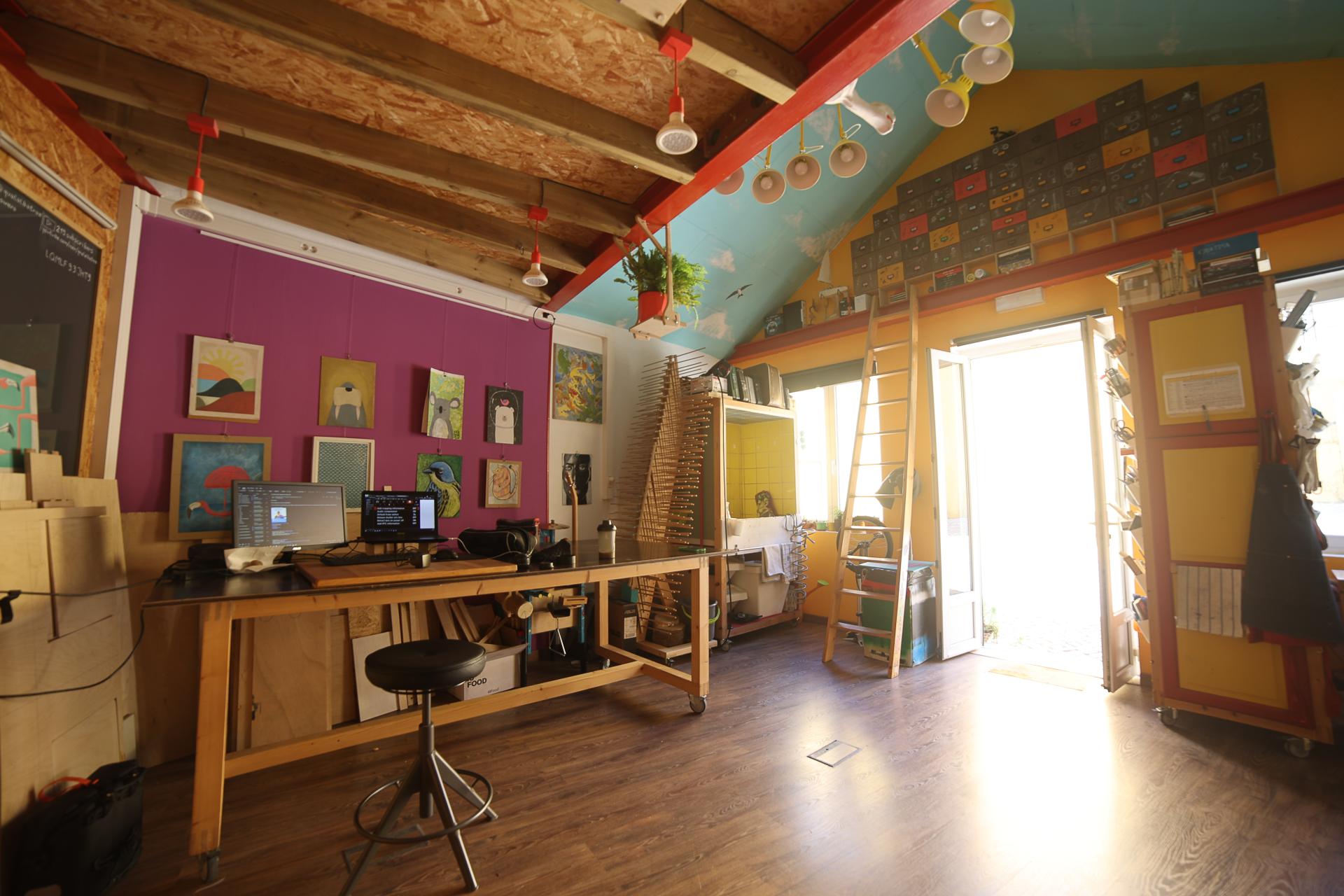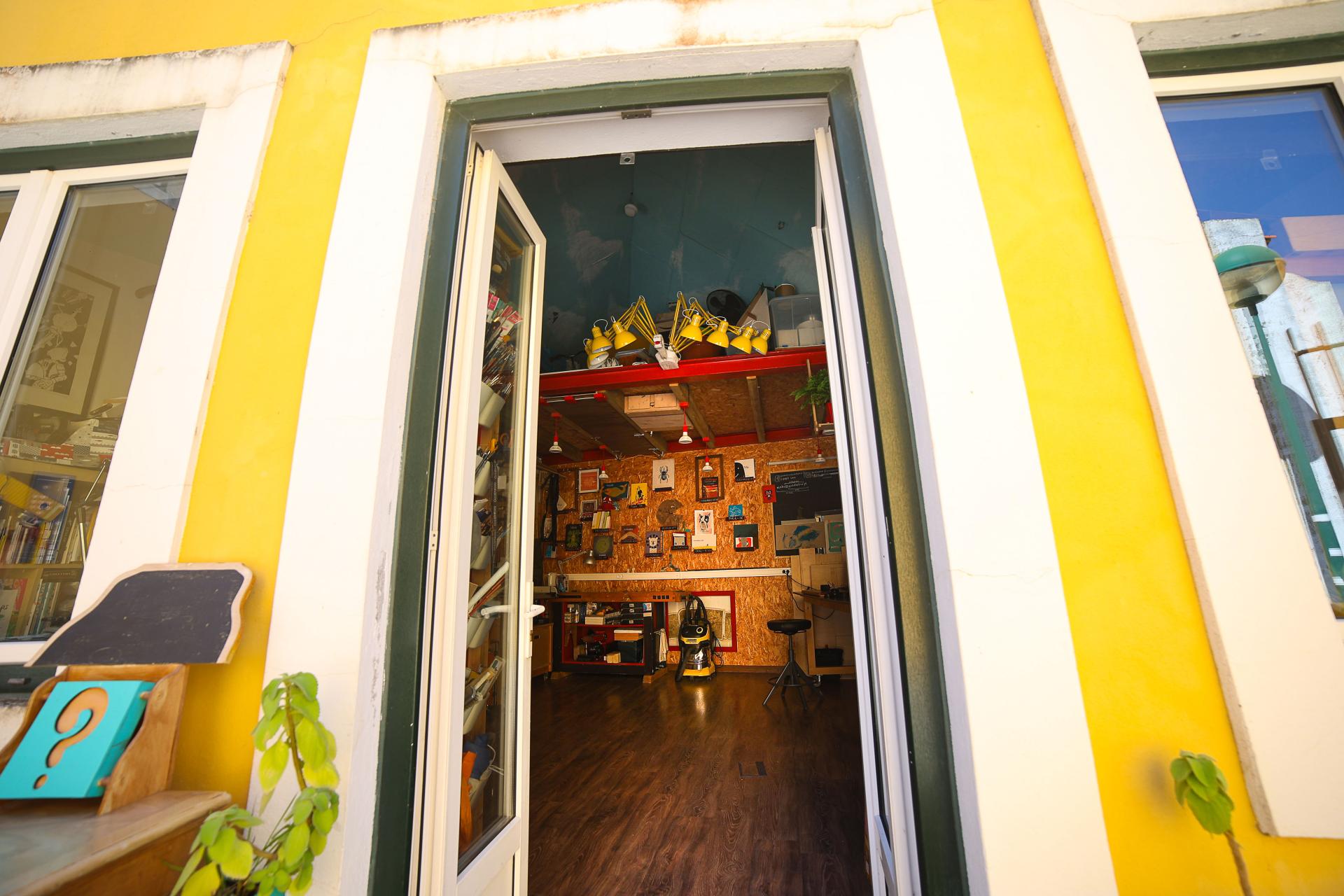Oficina do Erro
Basic information
Project Title
Full project title
Category
Project Description
Right next to a babbling creek in an old gunpowder factory is our workshop. We call it “Oficina do Erro”, which stands for “Workshop of Mistakes” but also something like “Workshop of Roaming”. We fearlessly and proudly learn from mistakes and encourage a wandering mindset.
Here we err and make and share. Here we meet people and teach them to build things with their hands. Here we care for the insects, plants, and birds, and here we inspire the community.
Here we welcome everyone.
Project Region
EU Programme or fund
Description of the project
Summary
We work in a small thirty square meter building inside what was (from 1487 till 1988) an armament and gunpowder factory and is now an architectural heritage site and a museum (Fábrica da Pólvora de Barcarena). Picture bright yellow thick-walled buildings, a babbling brook and a valley full of trees and birds, mosses and grass.
Right next to the creek is our workshop. We call it “Oficina do Erro”, which stands for “Workshop of Mistakes” but also something like “Workshop of Roaming”. We fearlessly and proudly learn from mistakes and encourage a wandering mindset. It sounds much cooler in Portuguese.
Here we err and make and share. Here we meet people and teach them to build things with their hands. Here we care for the insects, plants, and birds, and here we inspire the community. Here we welcome everyone.
We started off as a publishing firm in 2007, making mainly children’s books. Then we began making handmade, screen printed books, and teaching artisanal printing techniques and bookbinding. From there, without much effort we slipped into cultural mediation, first promoting our books, reading in general, adding music, poetry, illustration, and then working with Cultural institutions and municipalities and developing interesting and inspiring ideas aimed to engage and inspire people.
Opening the workshop in 2016 in such a stunning place, encouraged us even more to introduce environmental issues into everything we make. (Making of the workshop video: https://www.youtube.com/watch?v=zH5cPAqpzEE)
The look and feel of our little yellow building reflect, aesthetically and functionally all that we stand for. It is a place to share ideas, learn something new, try something fresh, repair something old and to make mistakes.
Key objectives for sustainability
Oficina do Erro is a site-specific project in the sense that it is developed in an industrial facility that has been in activity since the 15th century and now is a heritage and leisure public space. The gunpowder factory was built here because of the river (that provided energy and transport means, linking to the Tagus river); the eucalyptus trees because they burn slower, in case of an explosion. Birds, insects and amphibians find solace in this humanised yet wild ecosystem.
It joins history and aesthetics, science and technology, sustainability and a harsh reflection about the effects of human activities. Often people literally stumble into our workshop or our activities. We have a strong partnership with the museum, creating activities that link heritage and sustainability.
There is an idea that has been lost. It’s an old way of looking at the world. When something broke, or when you needed something, the first thought was not about where you could buy a new thing, but how you could repair, or build a thing.
This idea is powerful and that power lives in everyone. Our aim is to fan that flame again. To teach a person to fish. To empower the community.
Here we have the tools to build and repair things. But instead of doing that we invite people to come in and teach them to build and repair things themselves.
This idea is based on the Circular Economy, the Right to Repair, Makerspaces, Repair Cafes, and the Precious Plastic community.
Ever since our start as an artisanal press publisher, we valued the use of solvent free ink and recycled, sustainable handmade paper. (As an example: https://vimeo.com/111788888)
Now we teach about biological pest control and how to make birdhouses, insect hotels, how to do vermicomposting, and make seed bombs. All aimed at recovering the ecosystems of urban environments.
But mainly, with all that, our goal is to enfranchise the community. To slowly change the old give-them-a-fish mentality and to empower people.
Key objectives for aesthetics and quality
People need to be inspired. We also need magic in our lives, especially when we are inviting people to take risks, to try new things. As we said, we are site-specific, benefiting from a heritage site with a story that spans for more than five centuries and is literally drawn in stone. It is a beautiful place, where yellow, green, ochre and blue mingle with the eucalyptus scent, with the babbling river and bird songs all around us.
At Oficina do Erro we have covered the walls with tools and books, painted a cloud strewn sky on the ceiling, and built the furniture ourselves from reclaimed and new wood and old cabinets. We have put wheels on everything, so that we can transform this small space according to our needs. One time it is a printing studio where people try screen printing for the first time. Another time, it is a photo studio, where we shoot a video about building a kite from old plastic bags. (https://www.youtube.com/watch?v=S1oHsyGo6_8), and on the next day we make a boomerang from recycled bottle caps or we transform the workshop into a woodworking studio where we are building a giant tree for a community art project (look here: https://www.youtube.com/watch?v=CGzDK58G3Hk)
On weekends, families visit the gunpowder factory. They have lunch at one of the restaurants, then they hop over to the playground, as lovers share intimacies on the grass beneath the ash trees. From time to time they stop at our workshop and peer curiously inside.
As people come in, their eyes are drawn up to the painted sky where birds fly, and to the strange lustre made from a bit from an old chair and articulated lamps that look like legs. And thus a conversation starts about the grandfather who was a carpenter and had a tool wall just like this one, or how funny the plant in the old shoe looks.
In short, we aim for an inspirational DIY aesthetic, and since space is in short demand, we have to be inventive and practical.
Key objectives for inclusion
Qual Albatroz (“What Albatross”) was created in September 2007 and works in publishing; educational action; artistic intervention; ecology and sustainability. These four areas are based on the conviction that people can only fully develop their potential if they can have access to culture.
Oficina do Erro is a workshop for everyone. It is a privately and independently managed project in a public heritage site. The Oeiras municipality, a local authority, is a key partner. Not only do they lend us our building, but they have also had a pivotal role in our development. It has been an organic and slow process, built since 2015, by way of small experiences, with different audiences, incrementing the partnership through experiences.
We create workshops and activities for specific cultural events, that are, most of the times, free for the users, as they are financed through other contracts and projects. And we also offer our own range of activities aimed at young and old, special needs persons and groups. When possible, we use a “pay-what-you-can” policy for our self-organized activities. And we also keep vacancies reserved for social associations that work with underprivileged people.
The Oficina do Erro is open for anyone who wishes to develop a project, benefiting from our space and tools, as well as our mentoring, many times in a simple working side by side methodology.
During covid restriction times we started online activities like videos or drawing classes that have amassed an international following that encourages us to keep the online sessions going even through to post-covid times. (This is a musical collaboration video we organized in covid times: https://www.youtube.com/watch?v=LlbQ-7mTfIE)
The advantage of being small is that we easily adapt to new circumstances, changing and improving the way we can relate to the public.
Results in relation to category
We feel that our reach has been steadily growing throughout the community of the municipality and beyond. During these last five years that we have been working at Oficina do Erro, we have been able to create an economically viable and sustainable way of using this workshop to positively impact people’s lives.
Naturally, a gunpowder factory is built in a remote valley to minimize the impact when something goes boom. Access to Fábrica da Pólvora de Barcarena is not easy. Especially if you have no car. Now as a cultural open space the challenge is to get people to come.
We keep track of all activities, our social media feed growth, and participation. This track record represents an important learning opportunity to improve and to learn from mistakes, as well as to create new activities and partnerships.
Since 2015, we have:
- Amassed more than 1000 Instagram followers, more than 2000 followers on Facebook, and more than 32.000 views on our YouTube videos.
- Developed around 60 original activities, participated in more than 10 large events, worked on one long term project, and published numerous artistic limited-edition products.
- Hosted more than 4000 participants in one-to-one or small-scale activities – 714 patrons alone in 2019. You can see our 2019 report video here: https://www.youtube.com/watch?v=8S1ymDvQe08.
- Hosted more than 10.000 participants in larger events that include visits to schools, participation in cultural happenings and self-organized culture-feasts.
- Since covid began we’ve had more than 50 online classes leading up to more than 700 interactions during more than 130 hours.
In the beginning of this year, we started a new arts and sustainability programme with the museum, aiming to open a bigger makerspace and more regular activities, in order to reach more people. We are quite optimistic, and we know that we are the proof that partnerships between private bodies and local authorities can be a key factor for urban and social development.
How Citizens benefit
What seems to be doomed as a well-meaning utopia finds its space in a programme centred on doing, on handcraft, on experimentation and on the exercise of error as a formative process. It enhances the improvement of skills and leads to significant experiences. It is also closely linked to our role as citizens, as everybody must be capable of sharing their experiences with others, respect and protect the environment, participate actively and creatively in the construction of the common tangible and intangible heritage.
But really, it’s in the eyes. If you pay attention, you can see it. You can witness the moment a new idea permeates a mind and slightly changes a world view.
When you see how a solitary bee blocks the entrance of the hole in the insect hotel with spit and dirt to protect the egg she laid. When you grasp the concept that the blue covid masks are made from plastic and not from a sort of paper. And that the plastic takes 500 years to degrade, and that instead it can be recycled, using a mould and a panini press to make a coaster. When you first understand vermicomposting and the benefits of worm droppings for plant health. When you make your own cigar-box guitar, and you hear the bluesy sound of the tuned strings and realize that this came from your hands, and it wasn’t so hard. When you see a blue tit bring nesting materials to the nest box you carefully build and painted. Or when you lift the screen-printing mesh to see the result of your first print.
In many small ways we believe we make a difference. Be it a smile, or the urge to share something, the glint in the eye. Our way is one-to-one. It is harder, takes more time and willpower, but it is infinitely more rewarding.
Innovative character
Qual Albatroz is an innovative project for a set of reasons:
It is a private owned for-profit project that is built upon for areas of experimenting: publishing; educational action; artistic intervention; ecology and sustainability. These four areas are based on the conviction that people can only fully develop their potential if they can have access to culture.
It builds the projects through partnerships and small experiments, valuing a system of iterations, learning from mistakes and from research and commons sharing.
In a world of specialization, streamlining and fast results, we feel an urge to find our way back to slow culture. In a world of limited resources, continued exponential growth is the danger.
At Oficina do Erro we strive for slow community building, leading toward a stronger bond. We are always open to adapt and change the way we do things. We try to listen. To participants. To other partners. To the environment.
We openly share what we know and in turn learn from others. Knowledge is open source. We lend out our technical books and tools and when someone asks us to build or repair something, we prefer to teach the skills to make or repair it themselves. Side by side. Online. Onsite.
We do not specialize. We aim to know enough about many things. This not only helps us be adaptable, but it also forms our world view. It reinforces our place in an ever-changing world with unforeseen challenges.
We built a successful business and a way of life based in these principles. We do not define ourselves as publishers, artists or makers. We define ourselves as citizens, with ideals, skills and doubts. We are a thriving part of the community, and we not only welcome people in, as we outreach to others, overcoming geographical distance and economical challenges.
We are a solid business company. We define success in our own terms: sustainable, small scale, building upon partnerships, change and experiment.




